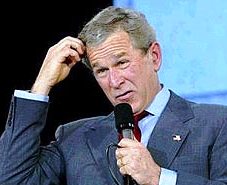Our DeSmog UK epic history series continues with a look at how Big Oil helped push President Bush to pull out of the Kyoto Protocol.
Despite the promising oil-rich foundation upon which George W. Bush was elected president in 2001, insiders were unsure that he would fight for them.
During his candidacy, Bush had suggested, although Kyoto was not economically favourable for America, that CO2 should be treated as a pollutant and, therefore, subject to regulation under the Clean Air Act.
Bush’s fence-sitting was strategic: swing states such as Florida were environmentally conscious and speaking out would likely give Democrat presidential candidate Al Gore the advantage.
But, optimistic environmentalists remained hopeful while wary oil-men were worried that it demonstrated a willingness to agree to the broad principles of the treaty.
A Rumoured Speech
Shortly after his inauguration, a rumour circulated that Bush planned to include a line reinforcing his earlier pledge in a forthcoming speech.
Word of the speech reached the Competitive Enterprise Institute (CEI), a Koch- and Exxon-funded think tank that helped donate to Bush’s presidential campaign. CEI set to work. As their founder and president, Fred Smith later told Newsweek: “We alerted anyone we thought could have influence and get the line, if it was in the speech, out.”
Despite the think tank’s best efforts, Environmental Protection Agency administrator Christine Todd Whitman testified, on 27 February 2001 at a Senate Committee on Environment and Public Works subcommittee, that she was in favour of regulating CO2 emissions under the Clean Air Act.
A week later, she signed a joint statement at the G8 Environment Ministers Meeting which said: “We commit ourselves to strive to reach agreement on outstanding political issues and to ensure in a cost-effective manner the environmental integrity of the Kyoto Protocol.”
The President’s Position
At this, the denial machine set in motion. Haley Barbour, a lobbyist for a utility firm that stood to lose if greenhouse gases were regulated, urged Vice President Dick Cheney in a March 1 memo to persuade Bush not to align with the “eco-extremism” of those who saw carbon dioxide as a pollutant.
A group of far-right Republican senators wrote an open letter to their new president. In light of Whitman’s testimony, they asked that Bush clarify his position on climate change, “in particular the Kyoto Protocol, and the regulation of carbon dioxide under the Clean Air Act.”
Aware of the rising tide against her, Whitman went to the Oval Office to fight her case on the morning of March 13. But, Bush had already composed his response, shortly to be sent via Cheney to the senators, which he read to her.
“I do not believe,” read the letter, “that the government should impose on power plants mandatory emissions reductions for carbon dioxide, which is not a ‘pollutant’ under the Clean Air Act.”
Information from the Department of Energy had shown that consumers’ energy bills might be affected, and that this warranted a re-evaluation of his earlier pledge, “especially… given the incomplete state of scientific knowledge of the causes of and solution to global climate change.”
Polluter Pull-Out
Whitman left defeated, just as the puppeteer Cheney arrived to hand-deliver the President’s response to the senators.
By the end of the month, the world’s biggest polluter had pulled out of Kyoto.
Whitman, who later said the decision was “the equivalent to ‘flipping the bird’ frankly to the rest of the world,” was the one to deliver the news. “We have no interest in implementing that treaty,” the former New Jersey Governor told assembled journalists.
Though the terms of the treaty would be finalised in Bonn that July, they would be made all but useless, with the world’s largest polluter out of the game.
Years later, freedom of information disclosures revealed the industry’s input to this decision. A briefing note prepared for Paula Dobrianksy, Under-Secretary of State for Global Affairs, ahead of her meeting with Glenn Kelly of the Exxon-bankrolled Global Climate Coalition, states: “POTUS [President of the United States] rejected Kyoto, in part, based on input from you… Interested in hearing from you, what type of international alternatives to Kyoto would you support?”
The DeSmog UK epic history series will continue with an account of how a NASA climate scientist was squeezed out of the White House debate on the environment.
Photo: The Whizzer Blogspot via Creative Commons
Subscribe to our newsletter
Stay up to date with DeSmog news and alerts







